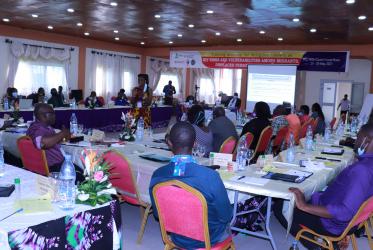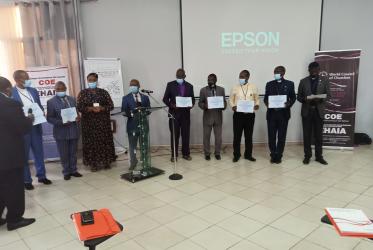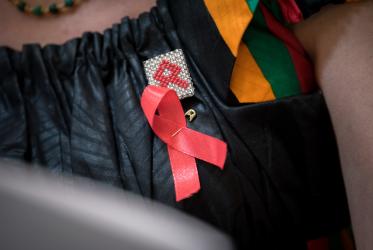World Council of Churches
EXECUTIVE COMMITTEE
Etchmiadzin, Armenia
8-13 June 2015
Doc. No. 29 rev
For action
For I was hungry and you gave me food, I was thirsty and you gave me drink, I was a stranger and you welcomed me. (Matthew 25:35)
The executive committee of the World Council of Churches (WCC) expresses its deep concern for the lives of the increasing numbers of people globally who, fleeing from situations of violence, oppression, occupation or economic deprivation, are driven to undertake journeys of desperate risk and danger. This escalating global problem, with different expressions and responses in different contexts, has been recently and tragically exemplified by the deaths of unprecedented numbers of migrants and refugees seeking to cross the Mediterranean Sea to Europe, and of Rohingya and Bangladeshi migrants on the Andaman Sea. The recent killings of Ethiopian Christian migrant workers by the so-called ‘Islamic State’ in Libya, and the xenophobic violence against migrants in South Africa, are also illustrative of the special vulnerability of people who leave their home countries in the universal human pursuit of safety and a better life for themselves and their families.
The WCC acknowledges and respects the prerogative of sovereign states to define arrangements for the control of their own borders and the conditions of entry and stay, and recognizes the challenge posed by the volume of irregular migrants. But we expect all states to honour the letter and spirit of their obligations under international law, including human rights and refugee law. We consider it legally and ethically inadmissible for states to abdicate their responsibilities for saving lives and providing protection, or to seek to ‘outsource’ them to other states and territories.
All members of the international community have a moral and legal duty to save the lives of those in jeopardy at sea or in transit, regardless of their origin and status. We acknowledge and affirm the efforts of many seafarers to rescue people at sea. And we welcome the European Union’s commitment to tripling the resources for Operations ‘Triton’ and ‘Poseidon’ in the Mediterranean Sea, but search-and-rescue must be clearly defined as the top priority of these operations. Similarly, governments of South East Asian countries must ensure that people in danger at sea or in transit are rescued rather than put back in jeopardy.
In the case of Europe, we are aware of concerns about the volume of legal migration within the EU bloc.However this matter is addressed it must not be at the expense of refugees and other people fleeing situations of extreme distress. We note that the responsibility for receiving the increasing numbers of irregular migrants and refugees rests most heavily at present on Italy and Greece, and it is clear that a fairer distribution of responsibility within the EU is both morally desirable and practically necessary. We therefore welcome proposals for a fairer sharing of this responsibility across the EU, and believe that EU member states should support this objective. In any such distribution process, the motives and aspirations of refugees and migrants should be taken into consideration in determining their placement.
The criminal enterprise of smugglers and traffickers taking advantage of vulnerable and desperate people must certainly be stopped. We note with concern however the EU’s proposed anti-smuggling strategy, entailing a ‘chapter 7’ resolution by the UN Security Council authorizing the use of military force. In the absence of wider channels for legal and secure migration, people smugglers flourish, and the use of military force to prevent their activities risks making the journeys of irregular migrants and refugees even more perilous. Further, there should be a clearly defined political end goal for any such application of armed force. We are also concerned that military action within Libyan waters and territory risks further destabilizing a highly unstable region.
We note with concern that most of the short-term measures taken by the governments of affected countries and regions address the symptoms – irregular migrant arrivals – rather than the root causes of these population movements. The drivers of the population outflows are the situations of violence, oppression, occupation and economic deprivation which cause people to feel that they have no choice but to put their lives in such appalling jeopardy. Any comprehensive and genuine approach to addressing this challenge must therefore also encompass stronger and more effective long-term international action to resolve the conflicts, to end oppression and occupation, and to eliminate the extreme poverty from which so many people are obliged to flee.
We question the logic of a ‘closed-door’ ‘fortress’ mentality to addressing these challenges – whether in Europe, South East Asia, Australia or elsewhere in the world. Migration is a phenomenon common to all times and societies. A world that allows goods and capital to cross every border, but that does not allow its people to do the same risks losing its humanity. The great contributions made by migrants and refugees to the societies, economies and cultures of their countries of residence, whether permanent or temporary, need to be recognised. A strategy focussed on closing borders between nations and defending those borders against ‘strangers’ is – in the end – not only futile, but also harmful for all parties concerned – with the sole exception of the smugglers and traffickers who thrive wherever doors are shut.
Therefore, the WCC executive committee:
- Urges all states to provide for generous, safe, humane and accessible procedures for the legal migration of people into and out of their territories and to take proper measures against the abuse of the vulnerability of migrants, wherever they are.
- Calls on all governments to fulfil their moral and legal duty to save the lives of those in jeopardy at sea or in transit, and to refrain from any actions that might further endanger them. They should be received and cared for in conditions of respect and human dignity, regardless of their origin and prima facie status.
- Calls on EU member states to support the objective of achieving a fair distribution of responsibility within the EU for receiving and caring for the increasing numbers of irregular migrants and refugees.
- Calls on the members of the international community, and our governments, to commit to stronger and more effective long-term international action to resolve the conflicts, to end oppression and occupation, and to eliminate the extreme poverty driving these population movements.
- Invites WCC member churches and ecumenical partners, together with all people of goodwill, to promote a more open and welcoming approach to the ‘stranger’ and to the neighbour in need and distress, and to help receive and care for refugees and migrants in full respect for their God-given human dignity.




